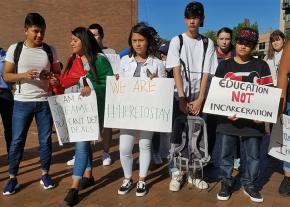Seattle students walk out for DACA
Seattle high schoolers protested in defense of undocumented students in an inspiring show of solidarity.
WE STOOD and listened as our peers shared stories of hope, oppression and resistance. It was the first time some of us realized how many of our high school classmates are undocumented. But it won't be the last time we stand to protect their rights.
On September 28, students from across Seattle walked out of their high schools to demand better treatment of their immigrant peers. Roughly 100 of us converged outside Seattle Central College to hear stories and poetry by undocumented students.
Many spoke of the heightened fear they face since the Trump administration announced the repeal of the Deferred Action for Childhood Arrivals (DACA) program. Others spoke about how under-supported they feel in their high schools and colleges. We listened, then marched with them to City Hall and demanded that they receive better support from our schools.
According to an issue brief by the Migration Policy Institute, over 350,000 middle and high school students are eligible for DACA. Without DACA, these students face an uncertain future because their status makes them ineligible for federal student aid.

These concerns were echoed by students at the rally, many of whom will apply to colleges in the U.S. this year.
By repealing DACA, Trump has thrown these lives into uncertainty with the stroke of his pen. Our high schools must work to ensure that these students have the same opportunities as their peers.
AS WE marched, we chanted, "Immigrant rights are human rights," "No one is illegal" and "All people are welcome"--phrases that are truisms in a just society, yet radical in our own.
The event was organized by fewer than 10 students from five high schools. One of them was Amina Dawud, a senior at Franklin High School and child of immigrants. When we first met to organize the walkout, Amina told me why she felt the need to make a statement:
I have seen how much DACA helped these people. Hearing my parents tell their stories and explain what they fled from, I knew that those supported under DACA had fled from just as poor situations.
When Amina saw ICE officers across the street of her high school campus, she knew that students had to stand up. "We have many students who are undocumented," she said. "I didn't even know that my best friend is undocumented until recently. So I knew I needed to do something--I knew I needed to get involved."
Our demands were clear. Through our chants and speak-outs at Seattle Central and City Hall, we pressured Seattle schools to remain a welcoming place for undocumented students and provide adequate resources towards that end.
This march was the start of something bigger--a broader coalition by and for students devoted to fighting for immigrant rights. We are organizing to protect one another, and we will make our voices heard.


